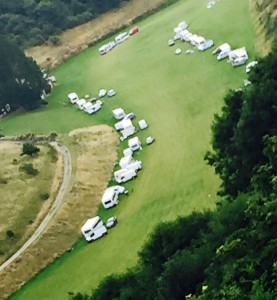By Alex Cook
More than 1,000 people have told the council their views on new council powers to clamp down on traveller camps and anti-social behaviour in the city’s open spaces.

A public consultation by Brighton and Hove City Council on plans to impose Public Space Protection Orders (PSPOs) on 12 sites across the city saw 1,100 people take part – one of the highest responses to date.
PSPOs would grant the council powers to issue fines and summons in areas where there is significant evidence of anti-social behaviour including: occupation of the land by people in caravans, vehicles or tents, fly tipping, fires and defecating.
A policy report published by the policy and resources committee last year said: “The occupation of these areas causes nuisance and annoyance for settled communities.
“Settled local communities report that occupation of the land and premises disrupts their ability to utilise that space as they feel intimidated by the presence of groups of people.”
Hove resident Michael Murray from the Brighton and Hove Environmental Action Group, which tracks the effects of unauthorised encampments on city parkland, supported the new powers.
He said: “There is 20 years of recorded fact on the impact of unlawful traveller trespass across this city. The cost to the residents of Brighton and Hove is totally unsustainable.”
The main areas under consideration, which reflect the number of incidents recorded are: Greenway, Hollingbury Park, Lawn Memorial Cemetery Woodingdean and Preston Park.
Under the new order the council could demand removal of any vehicles, structures or tents within 12 hours and require culprits to give their names and addresses.
However, some people said it could result in vulnerable groups being further marginalised.
Michelle Gavin from charity Friends, Families and Travellers which seeks to end racism and discrimination against gypsies and traveller communities said: “If people can’t provide their address they could be arrested on the spot.
“It will further marginalise and ultimately criminalise people who have nowhere to live. Where will it stop?”
And Secretary of Ditchling Rise Residents Association, Elspeth Broady said it could : “I’m not convinced that PSPOs will address the problems we face caring for green spaces such as Brighton Greenway.
“Dog poo, tagging and litter are the biggest problems and there’s already legislation to deal with those. Criminalising homeless people sleeping out does nothing to help solve homelessness.”
As it stands most anti-social behaviour is considered a civil offence meaning dealing with it can be a lengthy and expensive process for the council.
Under the new guidelines breaching a PSPO will constitute a criminal offence resulting in a fixed penalty notice or an immediate summons being served.
Other residents have raised concerns of a displacement effect meaning anti-social behaviour would move to other areas like The Level where it could not be criminalised.
Views of respondents will now be used by the council to draw up a detailed proposal.
Councillor Gill Mitchell, chair of the environment committee, said: “I would like to thank all the people and organisations who have taken the time to give their views on the idea of introducing public space protection orders in some of the city’s open spaces.
“It really is invaluable to have this level of detail which will feed into how we take this forward. All views will be taken into account and we’ll be discussing the consultation results at the policy and resources committee in July.”








